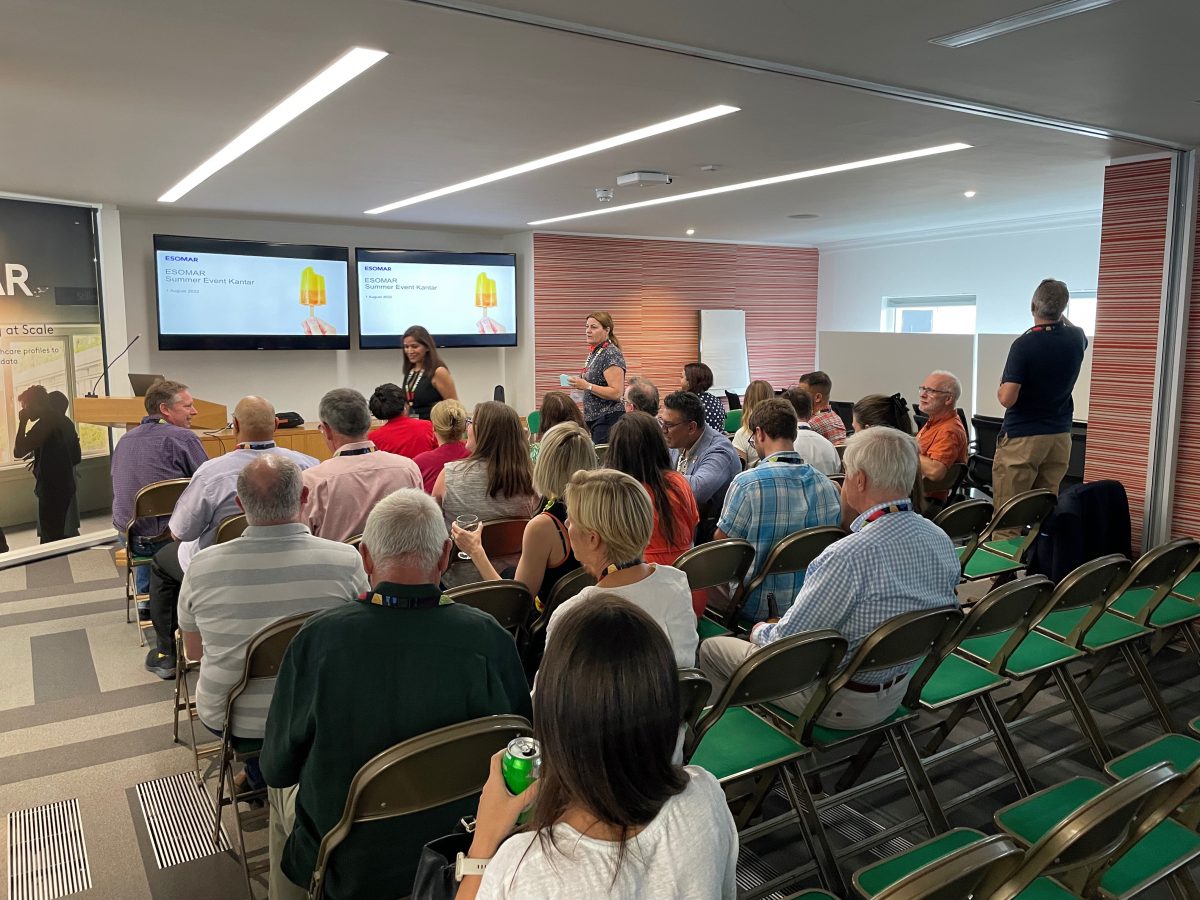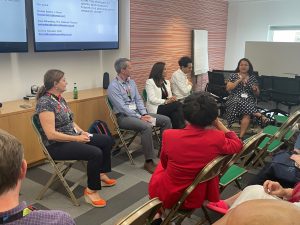 Reading Time: 3 minutes
Reading Time: 3 minutesWe at Mustard Towers were delighted that ESOMAR recently returned to action in the UK with its first in-person event in over three years. As a (somewhat) new recruit in the MRX and insights industry, I quickly realised that ESOMAR has an excellent reputation. In case you didn’t know, ESOMAR is the global community for people working in data, research and insight. I couldn’t wait to get stuck in and see what ESOMAR’s UK Summer Event had in store for me. I set my goals to meet as many new people as possible, learn what ESOMAR has to offer young people like me, and gain more understanding of what the future has in store for the world of data and insights.
MRX has changed a lot throughout these past three years (a whole global pandemic later), so there were many talking points people wanted to discuss and catch up on. The main theme of the event was ways of working, and what the impact has been on us.
Before we got stuck into that, Crispin Beale, Group President at Behaviourally and UK ESOMAR representative, began the evening by introducing interim CEO of ESOMAR Pravin Shekar. He then welcomed the new permanent CEO, Dr Parves Khan. It was great to witness the torch passing, as both Pravin and Parves outlined the importance of ESOMAR’s mission to bring the market research community together. Mainly by maintaining positivity, respect, and honesty in the industry on a global scale. Dr Khan’s credibility and enthusiasm as well as her advocacy for diversity and female empowerment in data and insights, make her an excellent choice for ESOMAR’s new CEO.
The main highlight of the evening included UK ESOMAR representative and Colonel Mustard, Lucy Davison. Lucy chaired a thought-provoking debate with some leading clients in the data and insights industry. The panellists included Shehnaz Hansraj, Head of Insights and Research at Viking Cruises, Alex Wheatley, Head of Data and Insight at the National Theatre UK (also an ESOMAR UK Rep), Danny Russell, Strategic Advisor at Danny Russell Consulting, and Komal Sahni, Head of Insight at L’Oreal.
 The discussion started with a debate on how the pandemic has created big changes to working environments. When asked if anyone would return to full-time work in an office, it was interesting to see that not a single person raised their hand. The luxury of working at home is now the norm for many. However, as the conversation demonstrated, we can’t always gloss over its disadvantages, in particular to younger members of the team, which is why hybrid working is essential.
The discussion started with a debate on how the pandemic has created big changes to working environments. When asked if anyone would return to full-time work in an office, it was interesting to see that not a single person raised their hand. The luxury of working at home is now the norm for many. However, as the conversation demonstrated, we can’t always gloss over its disadvantages, in particular to younger members of the team, which is why hybrid working is essential.
As Shehnaz Hansraj pointed out, there are challenges in creating visibility. Especially in a home environment when you can’t be on the ‘shop floor’. While many in insights have embraced working from home, the debate highlighted the need to maintain in-person networking, a positive work culture, and collaboration to create new ideas.
Undoubtedly, in the next few years, people will seek answers on whether working from home genuinely increases productivity. One thing’s for sure, communication will be key, as Alex Wheatley mentioned during the debate. Teams must have open conversations about what works for them if individuals want to work from home—having the freedom to define what works and what doesn’t will be vital in ensuring everyone’s on the right page and productivity isn’t compromised. And, as many of us would agree, to Danny Russell’s point, let’s stop inviting people to meetings when they aren’t needed – just because it’s online doesn’t make it any less of a waste of time.
Another important discussion point throughout the evening was how the MRX and insights sector could entice young professionals into the profession. Many audience members were keen to stress the value of integrating young people into the workforce for fresh perspectives and to encourage diversity. It was good to hear Pravin and Parves explain how ESOMAR works with local associations and universities, with the aim of helping emerging researchers and moulding them into professional jobs – not just in the research field but also in the wider data and analytics fields.
There were noticeable links between the discussions on working environments and attracting young people into the MRX and insights industry. Young professionals – speaking as one myself – are often in favour of the post-pandemic adjustment of working from home. However, they’re also becoming more vocal about what they need from their superiors. What’s encouraging is that the more experienced people in the room had their fingers on the pulse and were aware of this. It’s hopeful for young people who want a career in the industry, but the execution of how we attract them by upholding their values and desires is critical.
One thing’s for sure; I came away from my evening at the UK ESOMAR Summer Event feeling even more enthusiastic about the industry. There’s a passion and zest in MRX that is somewhat understated, and it helps that everyone is friendly. I look forward to the next ESOMAR event – bring on Congress 2022!